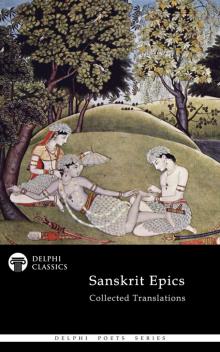- Home
- Delphi Classics
Masters of the Theatre
Masters of the Theatre Read online
Masters of the Theatre
This literary collection offers 18 of the greatest dramas ever written, featuring literature’s finest playwrights.
Delphi Classics, 2015
Version 2
Masters of the Theatre
Contents
OEDIPUS THE KING by Sophocles
THE BACCHÆ by Euripides
THE BIRDS by Aristophanes
AGAMEMNON by Seneca the Younger
DOCTOR FAUSTUS (B TEXT) by Christopher Marlowe
ROMEO AND JULIET by William Shakespeare
KING LEAR by William Shakespeare
THE ALCHEMIST by Ben Jonson
THE DUCHESS OF MALFI by John Webster
THE MISANTHROPE by Molière
SHE STOOPS TO CONQUER by Oliver Goldsmith
THE ROBBERS by Friedrich von Schiller
FAUST: PART ONE by Johann Wolfgang von Goethe
THE IMPORTANCE OF BEING EARNEST by Oscar Wilde
A DOLL’S HOUSE by Henrik Ibsen
MAN AND SUPERMAN by George Bernard Shaw
PETER PAN by J. M. Barrie
THE CHERRY ORCHARD by Anton Chekhov
© Delphi Classics 2015
OEDIPUS THE KING by Sophocles
429 B.C.
Translated by F. Storr
Regarded by many as the greatest ancient tragedy of them all, Oedipus the King was first performed in 429 BC. Surprisingly, the trilogy containing the play took second prize in the City Dionysia at its original performance. Aeschylus’ nephew Philocles took first prize at that competition, though his works are now all lost and forgotten. In his Poetics, Aristotle considered Oedipus the King to be the tragedy which best matched his prescription for how drama should be made. Sophocles’ famous play is celebrated for being a model example of a perfectly structured tragedy, exploring the subtle development of the tragic hero’s plunge into maddened grief.
The second of Sophocles’ three Theban plays, Oedipus the King is the first in chronological order, followed by Oedipus at Colonus and then Antigone. The tragedy chronicles the story of the man destined from birth to murder his father and marry his mother. The play is an example of a classic tragedy, noticeably containing an emphasis on how Oedipus’ own faults contribute to the tragic hero’s downfall, as opposed to fate being the sole cause. The protagonist of the tragedy is the son of King Laius and Queen Jocasta of Thebes. After Laius learns from an oracle that he is doomed to perish by the hand of his own son, he tightly binds the feet of the infant together with a pin and orders Jocasta to kill the infant. Hesitant to do so, she orders a servant to commit the act for her. Instead, the servant takes the baby to a mountain top to die from exposure. A shepherd rescues the infant and names him Oedipus (“swollen feet”). The shepherd carries the baby with him to Corinth, where Oedipus is taken in and raised in the court of the childless King Polybus of Corinth as if he were his own.
As a young man in Corinth, Oedipus hears a rumour that he is not the natural son of Polybus and his wife Merope. When Oedipus questions the King and Queen, they deny it, but, still suspicious, he asks the Delphic Oracle who his parents really are. The Oracle ignores this question, telling him instead that he is destined to “Mate with his own mother, and shed/With his own hands the blood of his own sire”. Desperate to avoid his foretold fate, Oedipus leaves Corinth in the belief that Polybus and Merope are indeed his true parents and that, once away from them, he will never harm them.
On the road to Thebes, he meets Laius, his true father. Unaware of each other’s identities, they quarrel over whose chariot has right-of-way. King Laius moves to strike the insolent youth with his sceptre, but Oedipus throws him down from the chariot and kills him, thus fulfilling part of the oracle’s prophecy. He kills all but one of the other men. Shortly after, Oedipus solves the riddle of the Sphinx, which has baffled many a diviner: “What is the creature that walks on four legs in the morning, two legs at noon, and three in the evening?” To this Oedipus replies, “Man” (who crawls on all fours as an infant, walks upright later, and needs a walking stick in old age), and the distraught Sphinx throws herself off the cliffside. Oedipus’ reward for freeing the kingdom of Thebes from her curse is the kingship and the hand of Queen Dowager Jocasta, his biological mother. The prophecy is thus fulfilled, although none of the main characters are aware of this.
As the play begins, a priest and the chorus of Thebans arrive at the palace to call upon King Oedipus to aid them with the plague. Oedipus had sent his brother-in-law Creon to ask help of the oracle at Delphi, and he returns at that moment. Creon says the plague is the result of religious pollution, caused because the murderer of their former King, Laius, had never been caught. Oedipus vows to find the murderer and curses him for the plague that he has caused.
Oedipus summons the blind prophet Tiresias for help. When Tiresias arrives he claims to know the answers to Oedipus’ questions, but refuses to speak, instead telling Oedipus to abandon his search. Oedipus is enraged by Tiresias’ refusal, and says the prophet must be complicit in the murder. Outraged, Tiresias tells the king that Oedipus himself is the murderer. Oedipus cannot see how this could be and concludes that the prophet must have been paid off by Creon in an attempt to undermine him. The two argue vehemently and eventually Tiresias leaves, muttering darkly that when the murderer is discovered he shall be a native citizen of Thebes; brother and father to his own children and son and husband to his own mother.
Creon arrives to face Oedipus’ accusations. The King demands that Creon be executed, however the chorus convinces him to let Creon live. Jocasta enters and attempts to comfort Oedipus, telling him he should take no notice of prophets. Many years ago she and Laius received an oracle that never came true. It was said that Laius would be killed by his own son, but, as all Thebes knows, Laius was killed by bandits at a crossroads on the way to Delphi.
The mention of this crossroads causes Oedipus to pause and ask for more details. He asks Jocasta what Laius looked like and Oedipus suddenly becomes worried that Tiresias’ accusations were true. Oedipus then sends for the one surviving witness of the attack to be brought to the palace from the fields where he now works as a shepherd. Jocasta, confused, asks Oedipus what the matter is and he tells her. Many years ago, at a banquet in Corinth, a man drunkenly accused Oedipus of not being his father’s son. Bothered by the remark Oedipus went to Delphi and asked the oracle about his parentage. Instead of answers he was given a prophecy that he would one day murder his father and lie with his mother. Upon hearing this he resolved to leave Corinth and never return. While travelling he came to the very crossroads where Laius was killed, and encountered a carriage which attempted to drive him off the road. An argument ensued and Oedipus killed the travellers, including a man who matches Jocasta’s description of Laius. Oedipus has hope, however, because the story is that Laius was murdered by several robbers. If the shepherd confirms that Laius was attacked by many men, then Oedipus is not guilty.
A man arrives from Corinth with the message that Oedipus’ father has died. Oedipus, to the surprise of the messenger, is made ecstatic by this news, for it proves one half of the prophecy false, for now he can never kill his father. However, he still fears that he may somehow commit incest with his mother. The messenger, eager to ease Oedipus’ mind, tells him not to worry, because Merope was not in fact his real mother.
It emerges that this messenger was formerly a shepherd on Mount Cithaeron and that he was given a baby, which the childless Polybus then adopted. The baby, he says, was given to him by another shepherd from the Laius household, who had been told to get rid of the child. Oedipus asks the chorus if anyone knows who this man was or where he might be now. They respond that he is the same shepherd who was witness to th
e murder of Laius and whom Oedipus had already sent for. Jocasta, who has by now realised the truth, desperately begs Oedipus to stop asking questions, but he refuses and Jocasta runs into the palace.
When the shepherd arrives Oedipus questions him, but he begs to be allowed to leave without answering further. Nevertheless, Oedipus presses him, finally threatening torture and execution. It emerges that the child he gave away was Laius’ own son, and that Jocasta had given the baby to the shepherd to secretly be exposed upon the mountainside. This was done in fear of the prophecy that Jocasta said had never come true: that the child would kill its father.
Everything is at last revealed, and Oedipus curses himself and fate before leaving the stage. The chorus laments how even a great man can be felled by fate, and following this, a servant exits the palace to speak of what has happened inside. When Jocasta enters the house, she runs to the palace bedroom and hangs herself. Shortly afterward, Oedipus enters in a fury, calling on his servants to bring him a sword so that he might kill himself. He then rages through the house, until he comes upon Jocasta’s body. Giving a cry, Oedipus takes her down and removes the long gold pins that held her dress together, before plunging them into his own eyes in despair.
Blindly, Oedipus exits the palace and begs to be exiled as soon as possible. Creon enters, saying that Oedipus shall be taken into the house until oracles can be consulted regarding what is best to be done. Oedipus’ two daughters, Antigone and Ismene, are sent out, and Oedipus laments that they should be born to such a cursed family. He asks Creon to watch over them and Creon agrees, before sending Oedipus back into the palace. On an empty stage the chorus repeat the common Greek maxim, that no man should be considered fortunate until he is dead.
‘Oedipus after he solves the riddle of the Sphinx’ by Jean-Auguste-Dominique Ingres
‘Oedipus Separating from Jocasta’ by Alexandre Cabanel
The Theatre of Dionysus, Athens - the birthplace of drama, where most of Sophocles’ plays were first performed
CONTENTS
ARGUMENT
DRAMATIS PERSONAE
OEDIPUS THE KING
The actor Louis Bouwmeester as Oedipus in the famous Dutch production of Oedipus the King c. 1896
A Hellenistic marble relief of Sophocles
This play was taken from our Complete Works edition:
ARGUMENT
To Laius, King of Thebes, an oracle foretold that the child born to him by his queen Jocasta would slay his father and wed his mother. So when in time a son was born the infant’s feet were riveted together and he was left to die on Mount Cithaeron. But a shepherd found the babe and tended him, and delivered him to another shepherd who took him to his master, the King of Corinth. Polybus being childless adopted the boy, who grew up believing that he was indeed the King’s son. Afterwards doubting his parentage he inquired of the Delphic god and heard himself the word declared before to Laius. Wherefore he fled from what he deemed his father’s house and in his flight he encountered and unwillingly slew his father Laius. Arriving at Thebes he answered the riddle of the Sphinx and the grateful Thebans made their deliverer king. So he reigned in the room of Laius, and espoused the widowed queen. Children were born to them and Thebes prospered under his rule, but again a grievous plague fell upon the city. Again the oracle was consulted and it bade them purge themselves of blood-guiltiness. Oedipus denounces the crime of which he is unaware, and undertakes to track out the criminal. Step by step it is brought home to him that he is the man. The closing scene reveals Jocasta slain by her own hand and Oedipus blinded by his own act and praying for death or exile.
DRAMATIS PERSONAE
Oedipus.
The Priest of Zeus.
Creon.
Chorus of Theban Elders.
Teiresias.
Jocasta.
Messenger.
Herd of Laius.
Second Messenger.
Scene: Thebes. Before the Palace of Oedipus.
OEDIPUS THE KING
Suppliants of all ages are seated round the altar at the palace doors, at their head a PRIEST OF ZEUS. To them enter OEDIPUS.
OEDIPUS
My children, latest born to Cadmus old,
Why sit ye here as suppliants, in your hands
Branches of olive filleted with wool?
What means this reek of incense everywhere,
And everywhere laments and litanies?
Children, it were not meet that I should learn
From others, and am hither come, myself,
I Oedipus, your world-renowned king.
Ho! aged sire, whose venerable locks
Proclaim thee spokesman of this company,
Explain your mood and purport. Is it dread
Of ill that moves you or a boon ye crave?
My zeal in your behalf ye cannot doubt;
Ruthless indeed were I and obdurate
If such petitioners as you I spurned.
PRIEST
Yea, Oedipus, my sovereign lord and king,
Thou seest how both extremes of age besiege
Thy palace altars — fledglings hardly winged,
and greybeards bowed with years; priests, as am I
of Zeus, and these the flower of our youth.
Meanwhile, the common folk, with wreathed boughs
Crowd our two market-places, or before
Both shrines of Pallas congregate, or where
Ismenus gives his oracles by fire.
For, as thou seest thyself, our ship of State,
Sore buffeted, can no more lift her head,
Foundered beneath a weltering surge of blood.
A blight is on our harvest in the ear,
A blight upon the grazing flocks and herds,
A blight on wives in travail; and withal
Armed with his blazing torch the God of Plague
Hath swooped upon our city emptying
The house of Cadmus, and the murky realm
Of Pluto is full fed with groans and tears.
Therefore, O King, here at thy hearth we sit,
I and these children; not as deeming thee
A new divinity, but the first of men;
First in the common accidents of life,
And first in visitations of the Gods.
Art thou not he who coming to the town
of Cadmus freed us from the tax we paid
To the fell songstress? Nor hadst thou received
Prompting from us or been by others schooled;
No, by a god inspired (so all men deem,
And testify) didst thou renew our life.
And now, O Oedipus, our peerless king,
All we thy votaries beseech thee, find
Some succor, whether by a voice from heaven
Whispered, or haply known by human wit.
Tried counselors, methinks, are aptest found 1
To furnish for the future pregnant rede.
Upraise, O chief of men, upraise our State!
Look to thy laurels! for thy zeal of yore
Our country’s savior thou art justly hailed:
O never may we thus record thy reign: —
“He raised us up only to cast us down.”
Uplift us, build our city on a rock.
Thy happy star ascendant brought us luck,
O let it not decline! If thou wouldst rule
This land, as now thou reignest, better sure
To rule a peopled than a desert realm.
Nor battlements nor galleys aught avail,
If men to man and guards to guard them tail.
OEDIPUS
Ah! my poor children, known, ah, known too well,
The quest that brings you hither and your need.
Ye sicken all, well wot I, yet my pain,
How great soever yours, outtops it all.
Your sorrow touches each man severally,
Him and none other, but I grieve at once
Both for the general and myself and you.
/>
Therefore ye rouse no sluggard from day-dreams.
Many, my children, are the tears I’ve wept,
And threaded many a maze of weary thought.
Thus pondering one clue of hope I caught,
And tracked it up; I have sent Menoeceus’ son,
Creon, my consort’s brother, to inquire
Of Pythian Phoebus at his Delphic shrine,
How I might save the State by act or word.
And now I reckon up the tale of days
Since he set forth, and marvel how he fares.
’Tis strange, this endless tarrying, passing strange.
But when he comes, then I were base indeed,
If I perform not all the god declares.
PRIEST
Thy words are well timed; even as thou speakest
That shouting tells me Creon is at hand.
OEDIPUS
O King Apollo! may his joyous looks
Be presage of the joyous news he brings!
PRIEST
As I surmise, ’tis welcome; else his head
Had scarce been crowned with berry-laden bays.
OEDIPUS
We soon shall know; he’s now in earshot range.
[Enter CREON]
My royal cousin, say, Menoeceus’ child,
What message hast thou brought us from the god?
CREON
Good news, for e’en intolerable ills,
Finding right issue, tend to naught but good.
OEDIPUS
How runs the oracle? thus far thy words
Give me no ground for confidence or fear.
CREON
If thou wouldst hear my message publicly,
I’ll tell thee straight, or with thee pass within.
OEDIPUS
Speak before all; the burden that I bear
Is more for these my subjects than myself.
CREON
Let me report then all the god declared.
King Phoebus bids us straitly extirpate
A fell pollution that infests the land,

 Masters of the Theatre
Masters of the Theatre Masters of the Novella
Masters of the Novella The Sanskrit Epics
The Sanskrit Epics